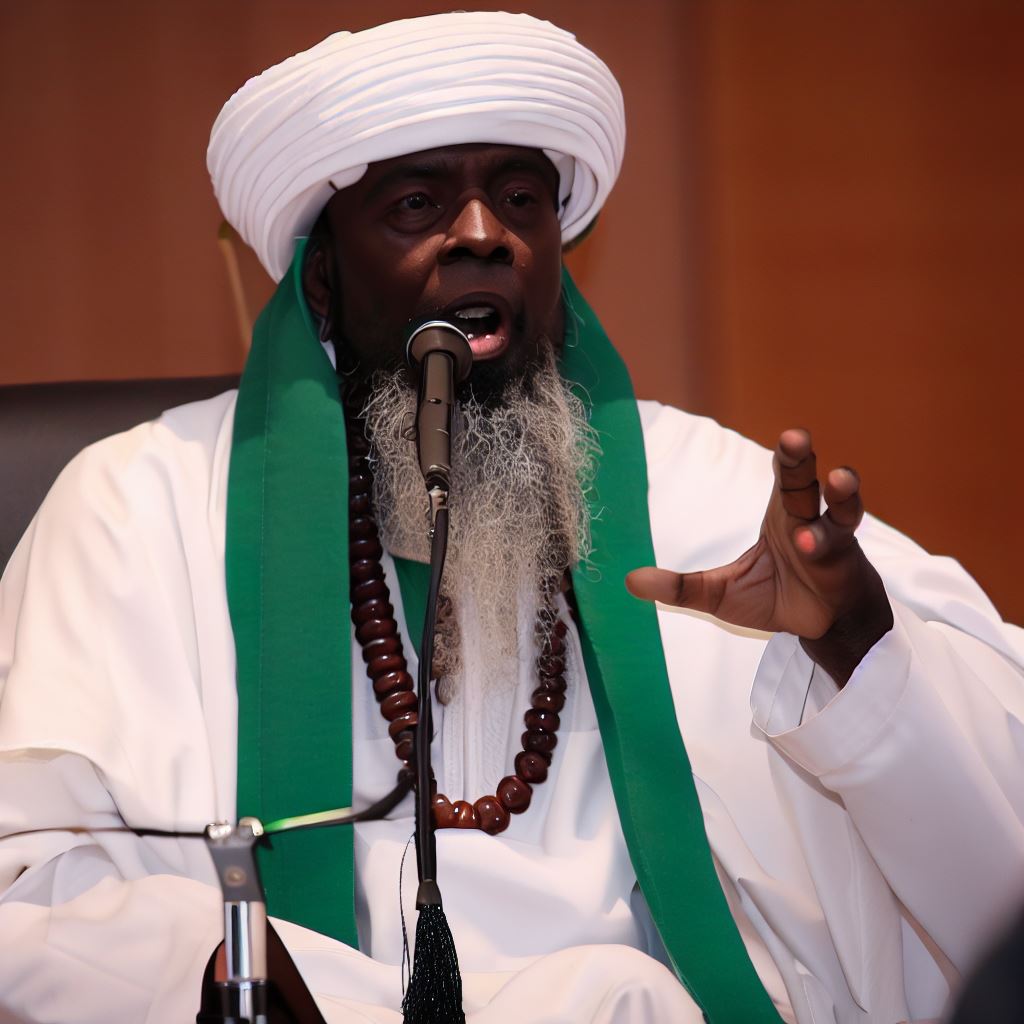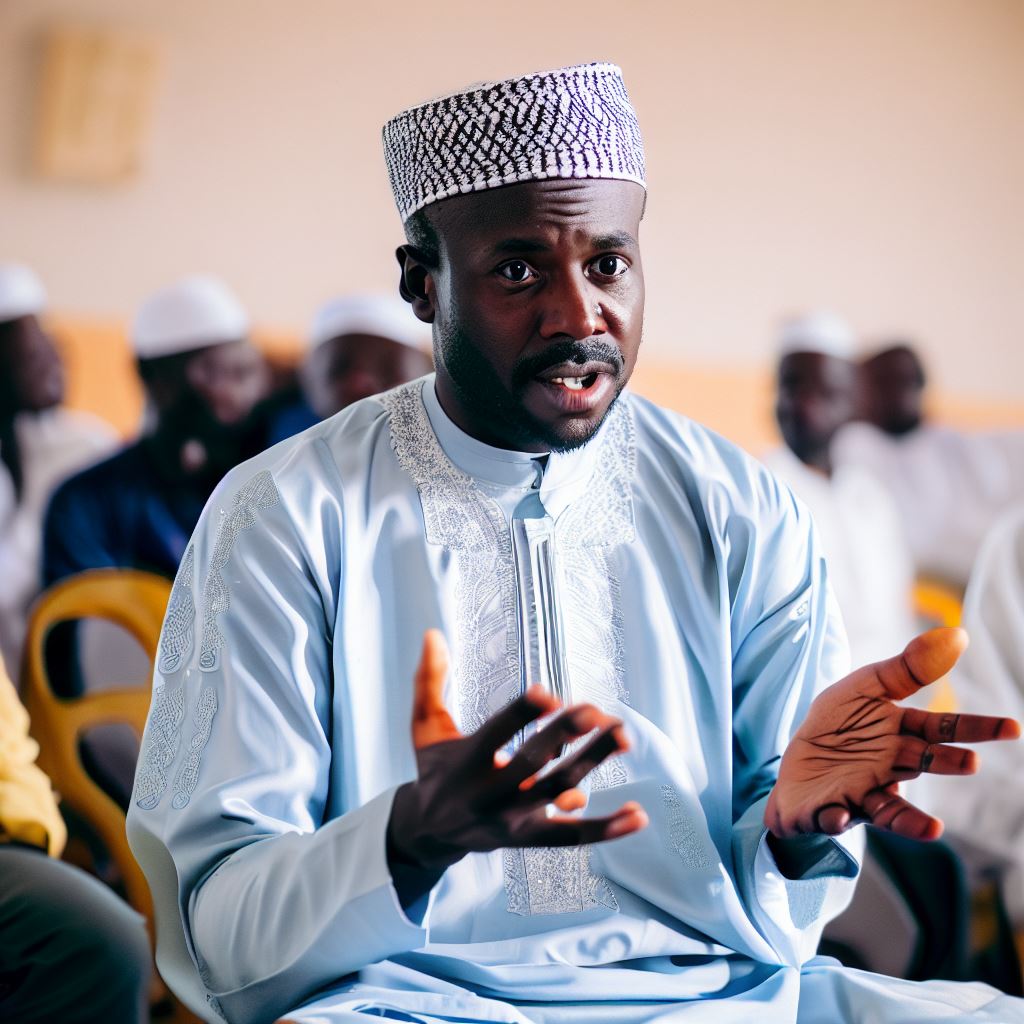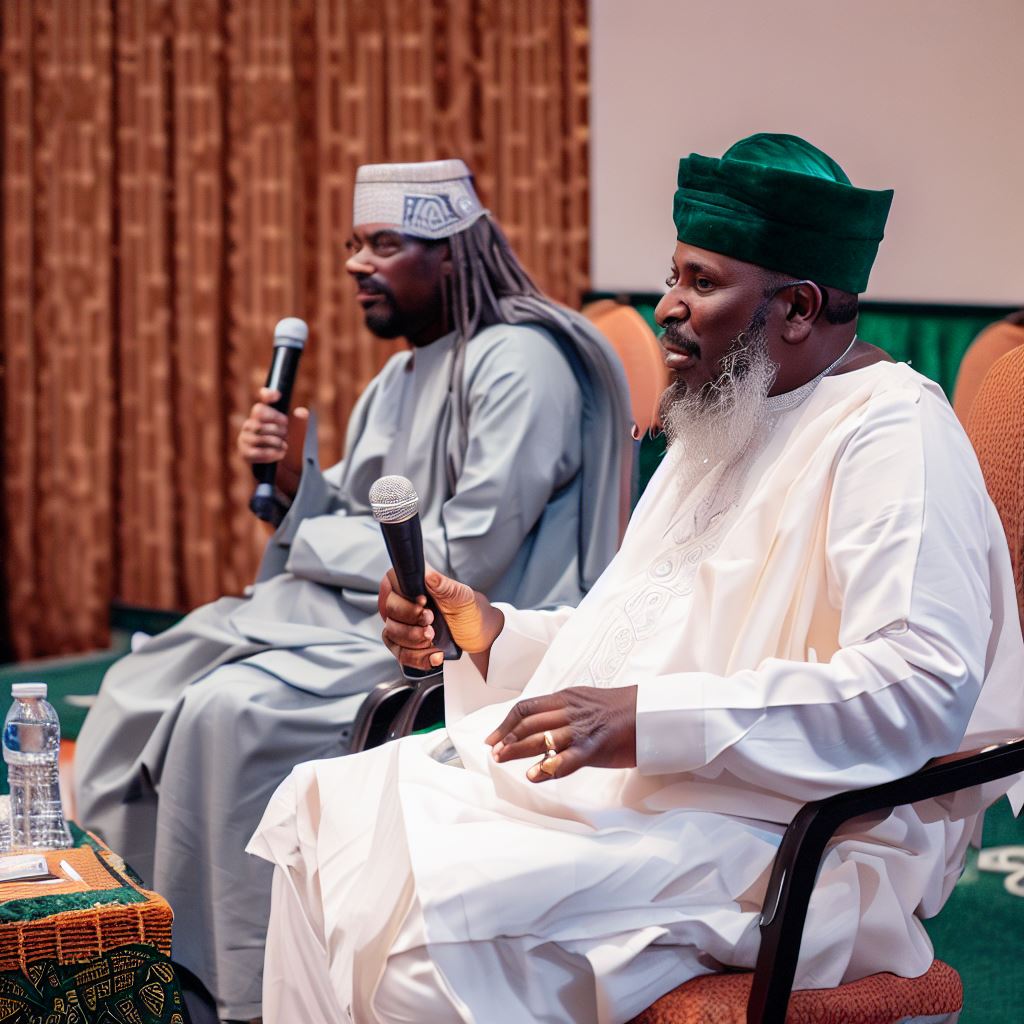Introduction
The Imam profession refers to religious leaders in the Islamic faith who lead prayers and provide guidance.
Cultural influences are crucial in shaping the Imam profession as they impact their roles, practices, and beliefs.
This blog post provides an overview of how cultural influences shape the Imam profession in Nigeria.
Cultural influences shape the Imam profession, manifesting in their roles, practices, and beliefs. In Nigeria, where diverse cultural traditions coexist, these influences play a vital role in shaping the Imam’s work.
The Imam profession, encompassing religious leaders in the Islamic faith, holds significant importance. Imams lead prayers, instruct on religious matters, and provide guidance to the Muslim community.
Cultural influences, rooted in Nigerian traditions and customs, heavily impact the Imam’s role.
The Imam’s duties extend beyond religious leadership; they also act as community leaders, resolving disputes and promoting social cohesion.
Furthermore, cultural practices influence the Imam’s preaching style, language preference, and the specific religious rituals emphasized during sermons.
Beliefs and practices within Nigerian culture also shape the Imam profession.
Variant interpretations of Islamic teachings, influenced by cultural beliefs, often impact the way Imams deliver sermons and handle religious matters.
For example, cultural practices surrounding marriage, gender roles, and social hierarchy may impact the Imam’s guidance on these issues.
This blog post aims to explore the various cultural influences that shape the Imam profession in Nigeria.
It will delve into specific examples of how cultural practices impact the role of Imams, their preaching styles, and the overall religious landscape.
By understanding these influences, we can appreciate the diversity within the Imam profession and better grasp the multifaceted nature of Nigerian Islamic culture.
Stay tuned for an insightful exploration of these cultural influences on the Imam profession in Nigeria.
Historical Background of Islam in Nigeria
Islam has a long and rich history in Nigeria, with its arrival dating back to ancient times.
The spread of Islam in Nigeria can be attributed to various factors, including trade routes and the efforts of early Muslim merchants and scholars.
The historical background of Islam in Nigeria is essential to understand the cultural influences on the Imam profession in the country.
Arrival and spread of Islam in Nigeria
Islam first found its way to Nigeria through the trans-Saharan trade routes.
Muslim merchants from North Africa and Arabia traveled to cities in present-day Nigeria, such as Kano, Katsina, and Zaria, for trade purposes.
Through their interactions with the local population, they introduced Islamic teachings and established Muslim communities in these regions.
With time, Islam gradually spread beyond trade hubs to other parts of Nigeria. Islamic scholars and missionaries played a vital role in the propagation of Islam, converting individuals and communities to the religion.
The spread of Islam was not limited to certain ethnic groups or regions; it permeated different societal strata, encompassing both rulers and the common people.
Early influence of Arab and North African scholars on Islamic education
During the early centuries of Islam’s arrival in Nigeria, Arab and North African scholars had a significant influence on Islamic education in the region.
These scholars played a crucial role in the transmission of Islamic knowledge and the establishment of educational institutions.
Arab and North African scholars introduced Arabic as the language of Islamic education. They taught Islamic theology, jurisprudence, and Arabic language and literature.
Islamic centers of learning, known as madrasas, were established, where young Muslims received education in Islamic subjects and Arabic language.
Through their teachings, these scholars contributed to the cultivation of a knowledgeable class of Muslims and the development of a strong foundation for Islamic scholarship in Nigeria.
Islam’s integration with local Nigerian traditions and customs
As Islam took root in Nigeria, it began to integrate with local Nigerian traditions and customs.
This integration occurred due to the cultural diversity within Nigeria and the coexistence of various ethnic groups and religions.
Islamic practices and teachings gradually assimilated local Nigerian customs and beliefs, resulting in a unique form of Islamic culture in the country.
Islamic festivals, such as Eid al-Fitr and Eid al-Adha, became fused with pre-existing traditional ceremonies, creating a blend of Islamic and local Nigerian traditions.
Additionally, Islamic architecture, music, and art in Nigeria reflect a fusion of Arab and local Nigerian influences.
Mosques and Islamic structures incorporate local architectural styles, while Islamic music and art incorporate Nigerian cultural elements.
In essence, the historical background of Islam in Nigeria demonstrates how the religion arrived, spread, and integrated with local Nigerian traditions.
The arrival of Islam through trade routes, the influence of Arab and North African scholars on Islamic education, and the integration of Islamic practices with local customs have shaped the Imam profession in Nigeria.
Understanding these cultural influences is essential to grasp the unique characteristics of the Imam profession in the Nigerian context.
Read: How to Become an Imam in Nigeria: A Step Guide
Cultural Factors Shaping the Imam Profession in Nigeria
Tribal diversity and its impact on the role of Imams
- Nigeria’s diverse tribes contribute to the variations in the practices and responsibilities of Imams.
- The Hausa tribe, for instance, places great importance on the role of Imams as community leaders.
- In contrast, the Yoruba tribe values traditional rulers more than Imams.
- These tribal differences influence the authority and influence of Imams within their respective communities.
- Imams in multicultural areas often face the challenge of representing and serving multiple tribes.
Influence of traditional African religious practices on the Imam profession
- Traditional African religious beliefs and practices have left a lasting impact on the Imam profession.
- Some communities blend Islamic teachings with traditional rituals, creating a unique practice of Islam.
- Imams in such communities must incorporate these traditional elements into their religious teachings.
- This syncretism often results in a more tolerant and inclusive approach to Islamic teachings.
- Imams also play a role in bridging the gap between Islam and traditional religions, promoting harmony.
Gender roles and their effects on the Imam profession
- Nigerian society traditionally assigns specific gender roles, which affects the Imam profession.
- The role of an Imam has been predominantly held by men, limiting female participation.
- However, there is a growing movement advocating for female Imams to address gender inequality.
- Female Imams are crucial in providing religious guidance to women who prefer a female leader.
- Gender roles in Nigerian society continue to evolve, paving the way for increased female presence in the Imam profession.
In fact, cultural factors significantly shape the Imam profession in Nigeria.
The tribal diversity of Nigeria influences the role and authority of Imams, with variations across different tribes.
The influence of traditional African religious practices has resulted in syncretic forms of Islam, which Imams must navigate and incorporate into their teachings.
Furthermore, gender roles in Nigerian society impact the participation of women in the Imam profession, although attitudes are gradually changing.
Understanding these cultural influences is essential for a comprehensive analysis of the Imam profession in Nigeria and promoting inclusivity in religious leadership.
Read: Leading Mosques in Nigeria: Spotlight on Imams
Education and Training of Nigerian Imams
Traditional Islamic education methods
- Quran memorization and recitation are fundamental aspects of traditional Islamic education.
- Imams undergo rigorous training in understanding the Quran and its interpretations.
- Studying Hadiths and the life of Prophet Muhammad is also crucial for Imams’ education.
- Traditional Islamic education methods emphasize the importance of learning Arabic to understand religious texts.
The role of Quranic schools or Almajiri system
- Quranic schools play a significant role in the education and training of Nigerian Imams.
- The Almajiri system is prevalent, where young boys live with a religious scholar to learn the Quran.
- Almajiri students receive instruction in Quranic recitation, but limited emphasis on other subjects.
- This system provides a foundation for young boys to pursue a career as an Imam if they desire.
Impact of modern education systems on Imam training
- Modern education systems have influenced the training of Imams in Nigeria.
- Western education introduced subjects like math, science, and English to Imam training.
- Imams are now exposed to broader knowledge beyond religious studies.
- The integration of modern education helps Imams engage with wider societal and intellectual issues.
- Islamic universities and colleges have emerged, offering formal education for aspiring Imams.
- These institutions provide comprehensive training, combining religious and contemporary subjects.
- Imams graduating from these institutions often possess better communication and analytical skills.
- The blending of traditional and modern education equips Imams to meet contemporary challenges.
In short, the education and training of Nigerian Imams are influenced by cultural factors, including traditional Islamic methods, Quranic schools or the Almajiri system, and the impact of modern education systems.
Traditional methods focus on Quran memorization, studying Hadiths, and mastering Arabic. Quranic schools provide a foundation for young boys aspiring to become Imams.
The integration of modern education has broadened Imams’ knowledge, exposing them to subjects like math, science, and English.
Islamic universities and colleges now offer comprehensive training, combining religious and contemporary subjects.
Graduates from these institutions possess enhanced communication and analytical skills, enabling them to tackle contemporary challenges.
The blending of traditional and modern education equips Imams to serve their communities effectively and engage with wider societal issues.
These developments in education and training contribute to the evolving role of Imams in Nigerian society and their ability to navigate the complexities of a changing world.
Read: Salary and Benefits for Imams in Nigeria Explained

Regional Variations in the Imam Profession
Northern Nigeria and the Influence of Hausa-Fulani Culture
- Hausa-Fulani culture greatly influences the Imam profession in Northern Nigeria.
- The Imams in this region are predominantly Hausa-Fulani people who reflect their cultural values.
- Hausa-Fulani Imams prioritize community cohesion, respect for elders, and adherence to traditional religious practices.
- Traditional Islamic teachings in Northern Nigeria are passed down through generations, shaping the role of Imams.
- Hausa-Fulani Imams often act as mediators in conflict resolution while upholding Islamic principles.
- The influence of Hausa-Fulani culture on the Imam profession in Northern Nigeria is profound.
Yoruba Culture and Its Impact on the Imam Profession in Southwest Nigeria
- Yoruba culture has a distinct impact on the Imam profession in Southwest Nigeria.
- Yoruba Imams incorporate elements of their cultural heritage into their religious practices.
- They blend traditional Yoruba customs and Islamic traditions to cater to the needs of their communities.
- Yoruba Imams often conduct religious ceremonies that fuse Islamic practices with Yoruba cultural norms.
- Their role goes beyond religious leadership, as they also serve as cultural custodians for the Yoruba community.
- The Imam profession in Southwest Nigeria reflects the fusion of Yoruba culture and Islamic faith.
Other Cultural Regions and Their Unique Influences on the Imam Profession
- Nigeria’s diverse cultural regions have various impacts on the Imam profession.
- In the Igbo-dominated Southeast region, Imams incorporate Igbo language and traditions into their sermons.
- Imams in the Niger Delta region encompass local cultural practices in their religious teachings.
- The Middle Belt region exhibits diverse cultural influences, resulting in a fusion of different customs within the Imam profession.
- Each cultural region shapes the role of Imams by infusing local beliefs and practices.
- These unique influences contribute to the rich diversity of the Imam profession across Nigeria.
In general, the regional variations in Nigeria’s Imam profession reflect the influence of diverse cultural backgrounds.
The Hausa-Fulani culture in Northern Nigeria shapes the role of Imams with an emphasis on community cohesion and traditional values.
Yoruba culture in Southwest Nigeria merges Yoruba customs with Islamic traditions, creating a distinct Imam profession.
Other cultural regions like the Southeast, Niger Delta, and Middle Belt also contribute to the diversity by incorporating local customs and beliefs into the Imam profession.
Understanding these regional variations is crucial in comprehending the multifaceted nature of the Imam profession in Nigeria.
Read: Understanding the Role of Women Imams in Nigeria
Socio-Political Factors Affecting Imams in Nigeria
Relationship between Imams and political leaders
- Imams often interact closely with political leaders in Nigeria.
- They may have alliances or conflicts based on their differing interests.
- Political leaders seek the support and guidance of influential Imams.
- Imams may use their religious authority to influence political decisions.
- Political leaders may try to manipulate Imams for their own benefit.
Influence of Nigerian legal system and Sharia law on Imams
- The Nigerian legal system introduces complex dynamics for Imams.
- Sharia law, which governs Muslim affairs, impacts the role of Imams.
- Imams must navigate between traditional Islamic principles and legal requirements.
- Sharia law provides Imams with a framework to resolve community disputes.
- Imams have the responsibility to interpret and enforce Sharia law within their communities.
Impact of government policies and regulations on the Imam profession
- Government policies can significantly affect the Imam profession in Nigeria.
- Regulations may restrict the activities and freedom of Imams.
- Governments may impose specific qualifications and requirements for Imams.
- Imams may face censorship or persecution if their teachings challenge the government.
- Government funding or lack thereof can determine the financial stability of Imams.
In review, socio-political factors play a crucial role in shaping the Imam profession in Nigeria. The relationship between Imams and political leaders can have both positive and negative impacts.
The influence of the Nigerian legal system and Sharia law complicates the role of Imams. Government policies and regulations can either facilitate or hinder the work of Imams.
Understanding these factors is essential in comprehending the dynamics and challenges facing Imams in Nigeria.
Challenges and Opportunities for Nigerian Imams
As Nigerian Imams navigate their profession, they face both challenges and opportunities that require careful consideration and adaptation.
Preserving cultural heritage while adapting to modern society
A significant challenge that Nigerian Imams encounter is the need to preserve their cultural heritage while adapting to the demands of modern society.
With globalization and the influx of Western influences, traditional practices and customs may be at risk of being diluted or forgotten.
Imams have the responsibility to ensure that their cultural heritage, including traditional religious practices, is preserved and celebrated in order to maintain the unique identity of Islam in Nigeria.
Balancing religious responsibilities with socio-economic and political realities
Balancing religious responsibilities with socio-economic and political realities is another challenge faced by Nigerian Imams.
Nigeria is a diverse country with various socio-economic and political issues. Imams must navigate these complexities and provide guidance that is relevant and applicable to their communities.
This requires a deep understanding of the needs and challenges faced by their congregation, such as poverty, corruption, and instability.
Imams can play a vital role in addressing these issues through their teachings, but must also be mindful of maintaining neutrality and impartiality.
Embracing technology and social media in Imam profession
However, alongside these challenges, Nigerian Imams also have numerous opportunities at their disposal. One such opportunity is the integration of technology and social media into their profession.
With the widespread use of smartphones and the internet, Imams can reach a larger audience and disseminate religious teachings more effectively.
Platforms like YouTube, Facebook, and Twitter can be utilized to share sermons, engage with followers, and address contemporary issues.
Embracing technology can enhance the impact and relevance of the Imam profession in Nigeria.
In a nutshell, Nigerian Imams face the dual task of preserving their cultural heritage while adapting to modern society, and balancing religious responsibilities with socio-economic and political realities.
However, these challenges also present opportunities for growth and progress. By embracing technology and social media, Nigerian Imams can extend their reach and connect with a wider audience.
Ultimately, it is through thoughtful adaptation and innovation that the Imam profession in Nigeria can thrive and continue to make a positive impact on society.
Conclusion
Recap of the main points discussed
Cultural influences play a significant role in shaping the Imam profession in Nigeria. These influences include the dominant religion of Islam, indigenous cultural practices, and external influences.
The role of an Imam goes beyond religious leadership; they are also community leaders, educators, and mediators.
The imam profession is influenced by cultural factors such as language, dress code, traditional practices, and political climate.
Overall assessment of cultural influences on the Imam profession in Nigeria
Cultural influences have a profound impact on the Imam profession in Nigeria, shaping their roles, responsibilities, and interactions within the community.
Understanding these influences is crucial for effective leadership and promoting social cohesion.
It is important to embrace cultural diversity and navigate the complexities of cultural influences to strengthen the Imam profession in Nigeria and ensure its relevance and sustainability.
Future prospects and importance of acknowledging cultural factors in shaping the Imam profession in Nigeria
Nigeria continues to evolve culturally and socially, the Imam profession must adapt and respond accordingly.
Recognizing and acknowledging cultural factors is essential for the profession’s growth, promoting interfaith dialogue, and fostering peaceful coexistence among diverse ethnic and religious groups.
By embracing cultural influences, the Imam profession can effectively address current challenges, empower individuals, and contribute to national development.




